De Vlaamse schrijver Pol Hoste werd geboren in Lokeren op 25 maart 1947. Zie ook alle tags voor Pol Hoste op dit blog.
Uit: Tel
“- Hoe gaat het met je?
Je weet dat ik daar niet graag op antwoord, ik heb je al uitgelegd waarom.
– Is het zo erg dat ik gewoon eens vraag hoe het met je gaat, mag dat ook al niet meer?
– Het is helemaal niet erg, alleen hadden we afgesproken dat je het me niet meer zou vragen. Dat is alles. Als je me dus vraagt hoe het met me gaat herinner ik je alleen maar aan onze afspraak. Niet meer of niet minder. Dat hoef je dus helemaal niet erg te vinden.
– Dat weet ik, maar wind je niet meteen zo op, want dat is echt geen normale reactie meer, sta me toe dat ik dat zeg. Ik vraag gewoon even hoe het met je gaat en in plaats van te zeggen, zo of zo, maak je een drama alsof ik je geen ogenblik met rust laat. En het is al zo lang geleden dat we nog eens met elkaar gepraat hebben.
– Ik maak helemaal geen drama, ik herinner je alleen maar aan onze afspraak dat je me niet meer zou vragen hoe ik het maak. Want daarover gaat het en over niets anders.
– Is dat dan zo’n verschrikkelijke vraag? Straks ga ik nog denken dat ik helemaal abnormaal ben omdat ik gewoon even zeg: ‘Dag, hoe maak je het?’ Ik word er ziek van als ik daaraan denk. Ik begrijp helemaal niet waarom je me niet gewoon zegt, het gaat me goed of slecht of maar zo zo. Je mag het me gerust zeggen als het je slecht gaat. Misschien zit je in geldnood, sta je op het punt van ziek te worden, hoe kan ik dat weten, ik maak me alleen soms zorgen, dat is alles, dat kan toch, of mag ik dat ook niet meer? Ik kan je toch niet opbellen en dan doen alsof het helemaal niet om jou gaat? Alsof je er niet bent. Dat zou me een toestand worden. Ik ben niet gek.
– Ik ook niet.
– Kijk, als jij nu gewoon op mijn vraag had geantwoord: het gaat me zo of zo, ik verwacht daar helemaal geen uitgebreid antwoord op, denk dat maar niet, je hoeft me zeker niet alles te vertellen, helemaal niet, nee, alleen even gewoon hoe het met je gaat. Zo of zo, het zal me een zorg zijn, je beslist toch zelf wat je daarop antwoordt, ik zeg toch niet wat je me moet zeggen, integendeel, je hoeft me niet te sparen, ik bedoel, als je daar nu gewoon even kort op had geantwoord, dan hadden we er al lang over gezwegen in plaats van alweer zo tegen elkaar tekeer te gaan. Dat vind ik echt niet prettig.”
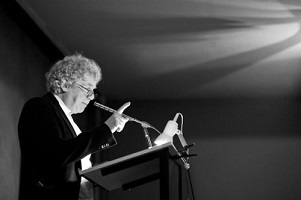
Pol Hoste (Lokeren, 25 maart 1947)
De Nederlandse dichter en vertaler Menno van der Beek werd geboren op 25 maart 1967 in Rotterdam. Zie ook alle tags voor Menno van der Beek op dit blog.
De held kan niet bewegen
De held kan niet bewegen zonder zijn infuus
maar hij heeft zin in roken, dus hij stapt uit bed
en hij beweegt zijn lichaam richting het toilet:
voorlopig heeft hij een excuus. Pas bij de lift
wordt het gevaarlijk. In zijn blauwe kamerjas
heeft hij om drie uur ’s nachts hier niets te zoeken
dus nu begint het avontuur. Zijn vingers tasten
met een vertrouwd gebaar al in in zijn badstof zakken
op zoek naar het bekende pakje. Maar hij is gestopt
na een slecht nieuws-gesprek, om toch iets terug te doen;
dus, dit gaat langer duren dan hij had gedacht:
hij moet op jacht. Hij rijdt met zijn infuus de lift in
en gaat omlaag. Hij wil opnieuw beginnen.
Grondhouding
Zo ver als mogelijk bij deze stad vandaan
in nat gras, met de handen in zijn zakken
gestrekt boven de grond in een net pak
midden in een weiland liggen. Een hectare
behaarde klei. Alleen van boven zichtbaar
trekt hij vertraagd zijn schouders op, verkrampt;
zijn nek verdwijnt. De tong tussen zijn tanden,
glimmende ogen in de camera,
die draaiend opstijgt: opgewekte kieviet
die steeds meer ziet. Daar schuiven aan de randen
boeren in beeld, de handen op de rug,
op zoek naar een gesprekje, maar dat wil hij niet.
Hij klopt zijn pak af met zijn natte handen
en holt het hele eind naar huis terug.
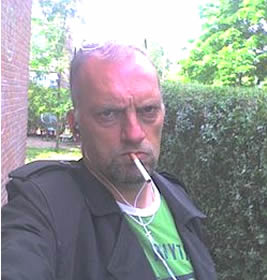
Menno Van der Beek (Rotterdam, 25 maart 1967)
De Amerikaanse schrijfster Flannery O’Connor werd geboren op 25 maart 1925 in Savannah, Georgia. Zie ook alle tags voor Flannery O’Connor op dit blog.
Uit: A Good Man Is Hard to Find and Other Stories
“The grandmother offered to hold the baby and the children’s mother passed him over the front seat to her. She set him on her knee and bounced him and told him about the things they were passing. She rolled her eyes and screwed up her mouth and stuck her leathery thin face into his smooth bland one. Occasionally he gave her a faraway smile. They passed a large cotton field with five or six graves fenced in the middle of it, like a small island. “Look at the graveyard!” the grandmother said, pointing it out. “That was the old family burying ground. That belonged to the plantation.”
“Where’s the plantation?” John Wesley asked.
“Gone With the Wind,” said the grandmother. “Ha. Ha.”
When the children finished all the comic books they had brought, they opened the lunch and ate it. The grandmother ate a peanut butter sandwich and an olive and would not let the children throw the box and the paper napkins out the window. When there was nothing else to do they played a game by choosing a cloud and making the other two guess what shape it suggested. John Wesley took one the shape of a cow and June Star guessed a cow and John Wesley said, no, an automobile, and June Star said he didn’t play fair, and they began to slap each other over the grandmother.
The grandmother said she would tell them a story if they would keep quiet. When she told a story, she rolled her eyes and waved her head and was very dramatic. She said once when she was a maiden lady she had been courted by a Mr. Edgar Atkins Teagarden from Jasper, Georgia. She said he was a very good-looking man and a gentleman and that he brought her a watermelon every Saturday afternoon with his initials cut in it, E. A. T. Well, one Saturday, she said, Mr. Teagarden brought the watermelon and there was nobody at home and he left it on the front porch and returned in his buggy to Jasper, but she never got the watermelon, she said, because a nigger boy ate it when he saw the initials, E. A. T.!“
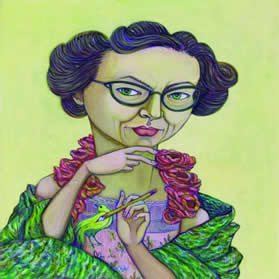
Flannery O’Connor (25 maart 1925 – 3 augustus 1964)
Portret door Katherine Sandoz
De Mexicaanse dichter en schrijver Jaime Sabines Gutiérrez werd geboren op 25 maart 1926 in Tuxtla Gutiérrez, Chiapas. Zie ook alle tags voor Jaime Sabines op dit blog.
IK WEET HET NIET ZEKER, maar ik denk het,
een vrouw en een man
worden op een dag verliefd,
langzamerhand blijven ze alleen,
iets in hun hart zegt hun dat ze alleen zijn,
alleen op aarde dringen ze in elkaar door,
beginnen ze elkaar te doden.
Alles gebeurt in stilte. Zoals
licht ontstaat in het oog.
Liefde verenigt lichamen.
In stilte vervullen ze elkaar.
Op een dag ontwaken ze, armen over elkaar;
denken dat ze alles weten.
Zien dat ze naakt zijn en alles weten.
(Ik weet het niet zeker. Ik denk het.)
Vertaald door Mariolein Sabarte Belacortu
I take pleasure in the way the rain beats its wings on the back of the floating city.
The dust comes down. The air is left clean, crossed by leaves of odour, by birds of coolness, by dreams. The sky receives the city that is being born.
Streetcars, buses, trucks, people on bicycles and on foot, carts of all colours, street-vendors, bakers, pots of tamales, grilles of baked bananas, balls flying between one child and another: the streets swell, the sounds of voices multiply in the last light of the day hung up to dry.
They come out like ants after the rain, to pick up the crumb of the sky, the little straw of eternity to take away to their dark houses, with cuttlefish hanging from the roofs, with weaving spiders under the beds, and with one familiar ghost, at least, in back of some door.
Thanks be to you, Mother of the Black Clouds, who have so whitened the face of the afternoon and have helped us to go on loving life.
Vertaald door W.S. Merwin
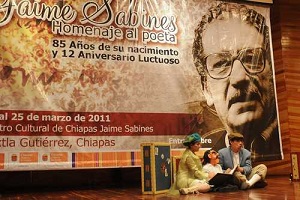
Jaime Sabines (25 maart 1926 – 19 maart 1999)
Affiche bij zijn 85e geboortedag in 2011
De Nederlandse cartoonist en striptekenaar Peter van Straaten werd geboren in Arnhem op 25 maart 1935. Zie ook alle tags voor Peter van Straaten op dit blog.
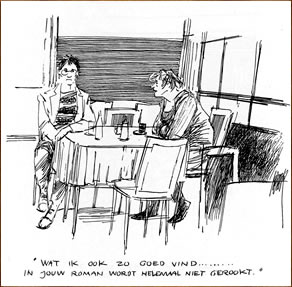
“Wat ik ook zo goed vind….
In jouw roman wordt helemaal niet gerookt”
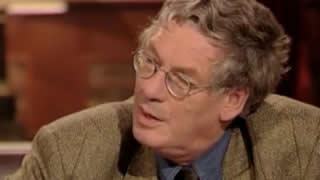
Peter Van Straaten (25 maart 1935 – 8 december 2016)
De Amerikaanse schrijfster en sociale activiste Toni Cade Bambara werd als Miltona Mirkin Cade geboren op 25 maart 1939 in New York. Zie ook alle tags voor Toni Cade Bambara op dit blog.
Uit: Gorilla, My Love
That was the year Hunca Bubba changed his name. Not a change up, but a change back, since Jefferson Winston Vale was the name in the first place. Which was news to me cause he’d been my Hunca Bubba my whole lifetime, since I couldn’t manage Uncle to save my life. So far as I was concerned it was a change completely to somethin soundin very geographical weather like to me, like somethin you’d find in a almanac. Or somethin you’d run across when you sittin in the navigator seat with a wet thumb on the map crinkly in your lap, watchin the roads and signs so when Granddaddy Vale say “Which was, Scout,” you got sense enough to say take the next exit or take a left or whatever it is. Not that Scout’s my name. Just the name Granddaddy call whoever sittin in the navigator seat. Which is usually me cause I don’t feature sittin in the back with the pecans. Now, you figure pecans all right to be sittin with. If you thinks so, that’s your business. But they dusty sometime and make you cough. And they got a way of slidin around and down sudden, like maybe a rat in the buckets, So if you scary like me, you sleep with the lights on and blame it on Baby Jason and, so as not to waste good electric, you study the maps. And that’s how come I’m in the navigator seat most times and get to be called Scout.
So Hunca Bubba in the back with the pecans and Baby Jason, and he in love. And we got to hear all this stuff about this woman he in love with and all. Which really ain’t enough to keep the mind alive, though Baby Jason got no better sense than to give his undivided attention and keep grabbin at the photograph which is just a picture of some skinny woman in a countrified dress with her hand shot up to her face like she shame fore cameras. But there’s a movie house in the background which I ax about. Cause I am a movie freak from way back, even though it do get me in trouble sometime.
Like when me and Big Brood and Baby Jason was on our own last Easter and couldn’t go to the Dorset cause we’d seen all the Three Stooges they was. And the RKO Hamilton was closed readying up for the Easter Pageant that night. And the West End, the Regun and the Sunset was too far, less we had grownups with us which we didn’t. So we walk up Amsterdam Avenue to the Washington and Gorilla, My Love playin, they say which suit me just fine, thought the “my love” part kinda drag Big Brood some.”
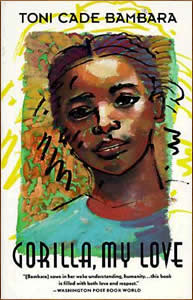
Toni Cade Bambara (25 maart 1939 – 9 december 1995)
Cover
De Italiaanse schrijver Antonio Fogazzaro werd geboren op 25 maart 1842 in Vicenza. Zie ook alle tags voor Antonio Fogazzaro op dit blog.
Uit: The Saint
“Then her thoughts dwelt on another painful passage in the letter from Italy which she had not mentioned. But, in spite of her silence, her misery was evident. Noemi pressed her lips to Jeanne’s forehead, and letting them rest there in silence, touched by the secret sorrow which accepted her sympathy. Then she slowly drew away from the long embrace as if fearful of severing some delicate thread which bound their two souls together.
“Perhaps that good old man knew where—Do you think he was in communication with ——” she murmured.
Jeanne shook her head in denial. During the September following that sad July, Jeanne’s unfortunate husband had died in Venice of delirium tremens. She had gone to the Villa Flores in October, and there in that same garden where the Marchesa Scremin had once laid bare her poor, suffering old heart to Don Giuseppe, had expressed a desire that Piero should be told of her husband’s death, should realise that he might henceforth think of her without a shadow of guilt, if indeed he still wished to think of her at all. Don Giuseppe first gently urged her not to abandon herself to this dream, and then avowed to her in all sincerity that no tidings of Piero had reached him since the day of his disappearance.
Fearing other questions, and unwilling any longer to expose her wound to the touch of unskilled fingers, Jeanne sought to change the subject. “Tell me about your monk,” she said. But just at that moment Carlino’s voice was heard in the hall.
“Not now,” replied Noemi. “To-night.”
Carlino came in, a white silk muffler round his neck, grumbling at the Lac d’Armour, which he pronounced a huge fraud, which only filled the air with odious, poisonous, little creatures. “To be sure.” said he, “love itself is no better.” Noemi would not allow him to talk of love. Why should he discuss a subject which he did not understand? Carlino thanked her. He had been on the point of falling in love with her; had greatly feared such a catastrophe. Her words, coming as they did so soon after her appearance in a certain offensive hat, with an ungraceful feather, and after some rather bourgeois expressions of admiration for that poor, tiresome devil Mendelssohn, had saved him à jamais. The two sparred gaily for some time, and, in spite of his poisoned tonsils, Carlino was in such high spirits that Noemi congratulated him on the subject of his novel. “It must be making rapid progress,” she said.”
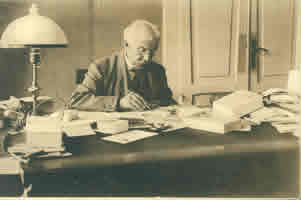
Antonio Fogazzaro (25 maart 1842 – 7 maart 1911)
Zie voor nog meer schrijvers van de 25e maart ook mijn vorige blog van vandaag.
